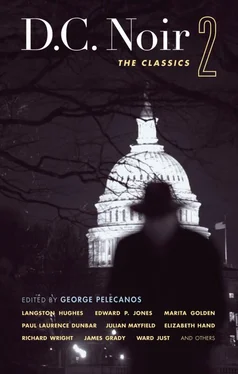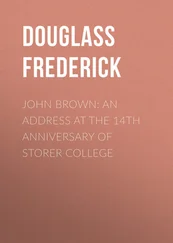“I can’t see him as anything else, and I don’t want to see him as anything else. I don’t care a hoot in hell,” she said. “Getting married doesn’t mean anything to me. It never did. I don’t care about it. He gets his … juice from politics. Politics and me. If politics goes, there’s only me. You know what happens then.” She shook her head. “It’s a disaster.”
“Does he know the way you feel?”
“Yes, and he says it doesn’t matter what I feel.”
“Doesn’t matter? ”
“Yes, he says it matters to him. ‘The only way,’ he says. ‘The only decent way.’ Besides, he hates his wife.”
“Oh.”
“He says he doesn’t want to go on sleeping with me in motel rooms.” She smiled wanly. “Well, that’s rather sweet, really.”
“I guess it is.”
“The thing is, he’s really an awfully good politician. I mean … he’s really good . Damned good. You know?”
“Look, Nora. Who is he?”
“You don’t know?” She was incredulous.
“How would I know?”
“I thought everybody knew.”
“Maybe everybody does. I don’t.”
When she told me, I shook my head. I’d had no idea.
He was a Midwestern senator, about forty, one of those who is always named on the lists of Most Effective Legislators, and for the last two elections as one of the many vice-presidential possibilities. As senators go in Washington, he had what the press calls high visibility. He was not a member of the leadership, but he had an independent base of his own, particularly among academics. He had been a university president at twenty-eight and resigned to run for the Senate. That was a highly implausible sequence except that this particular university president’s father had been governor, and his brother now published the state’s largest newspaper. That was all I knew about him, except that he was a Washington politician who was clean. He was intelligent, he was not a thief, and he seemed to know his own mind.
Nora stayed with me three days, she barely moved from the sofa. Her spirits improved, her confidence returned. In the mornings we drank coffee, in the afternoons tea, and in the evenings beer. She told me the story of the romance, how he had enchanted her …
“I mean literally enchanted,” she said. Then she went on to list the things they did together, her tone of voice changing. She became wistful, a most un-Nora tone of voice. She talked of the future, too, how he’d plotted his political career, the plans he had for the next national convention; this was before he decided to divorce his wife. But she thought he had a self-destructive part of him, and that was not always unappealing, surrounded as he was by success.
And not once in the first weeks did they ever speak of politics. They spent a weekend together in Nova Scotia, “and this was in December. Gosh, friend, did you ever spend a weekend in December in Nova Scotia? I was touched, he used my name to register at the hotel. Mr. and Mrs. N. Bryant. The way he did it, he was … oh, I don’t know what he was doing. I took it to mean he regarded us as equals. We spent that time in Nova Scotia, and other weekends in other wonderful places. Have you ever been to Chincoteague Island? And all the time he was legislating in the Senate, and passing me the documents, the bad ones, to get them out in the open.” She laughed. “He used to call me his publisher. He loved to see them all in print, then listen to the bitching and moaning inside the committee. The FBI was called in to investigate the leak. I thought it was all obvious, too obvious, so I passed some of the stuff on to you. Didn’t you ever wonder where it came from?”
“Well, I thought you just picked it up …”
“Friend, you don’t just ‘pick up’ the sort of stuff I was passing on to you. It was all golden.” She smiled proudly. “He loved it, really loved doing it, watching the reaction …”
“The romance, Nora. It sounds to me a little heavy, it isn’t the sort of thing you pursue in motel rooms.”
“But it is! Why not? It was just fine, it was going along just fine. Nothing wrong, he’d have to go home from time to time. But his wife didn’t really care. I mean he was under no pressure. Not from her. Not from me. Now it’s ended.”
“Say again why.”
“He’d be ruined without his political life. I know that . What do we do now? Does he open a law office, become a lobbyist? How about a beachcomber?”
“My God, you can get a divorce and still run for office. A hell of a lot of guys do that. You can divorce, remarry, and run for office. There’s no law …”
“You don’t understand. He’s a Catholic. He wants to marry me. You don’t recover from that. Not in his state. No, he’d have to give up politics altogether. Go do something else.”
“You’ve talked it all out?”
“Until I’m out of breath! He won’t listen. He wants to wait a year or two, then marry. He says he’s through with motels and through with his wife. But he doesn’t know what I know. Which is that without politics he’s a different man, and not as good a man. It’s the self-destructive part.”
“Nora, someone isn’t defined entirely by what they do. People have other sides to them, sides that have nothing to do with … plumbing or writing or politics.”
“Not him,” she said.
“So you’ve refused absolutely to marry him.”
She nodded slowly.
“What did he say?”
“He said he was going to get the divorce anyway.”
“And then?”
“And then I’ll change my mind, he said.”
The next day Nora left, sad but in control. She was talking now about going back to England or cajoling her editor into a long assignment abroad, Africa or the Far East. She told me that she would never, never marry the man; it would destroy both their spirits, they’d be hypnotized for the rest of their lives by what he’d thrown away. She knew in her heart it was irretrievable. She said she understood the political mind too well not to understand that. If a man gives up power against his will it haunts him. And there was no need, she said. No need at all. Just before she left my apartment she made the only anti-American remark I’d ever heard from her. She generally regarded this country with great affection and enthusiasm, and it amused her to write pro-American articles for her Yankee-baiting London newspaper.
“Goddamned American innocence,” she said. “Destructive virtue.”
“Thank you, Graham Greene,” I replied. The remark irritated me, it was unjustified; it was true of course, but unjustified. “Can’t you see your man is in a bind, too?”
“Well, we’re all in a bind. But he’s the one who’s forcing it, and there’s no need .”
I couldn’t quarrel with that.
A week later, she called me for a favor. She said she would ask me the favor if I would cook her dinner. We ate a memorable meal, and she was full of praise for the Saturday Evening Post story and one other story I was working on. All the time she was talking, I was looking at her and wishing the stars and chemistry had been right. She was in good form, looking as beautiful as I’d ever seen her. She’d had another of her dinners at the White House and was full of new stories and phrases. She was pouring coffee when she said she needed the favor right away.
“He’s coming over here tonight,” she said.
“Great,” I said.
“Just for an hour or two. It’s better to talk here, was what I thought. Not that there’s very much to talk about. Can you make yourself scarce?”
I smiled at the Americanism. “Sure.”
“He’s due in about ten minutes.”
“I’ll go now.”
“You can come back in an hour.”
Читать дальше











